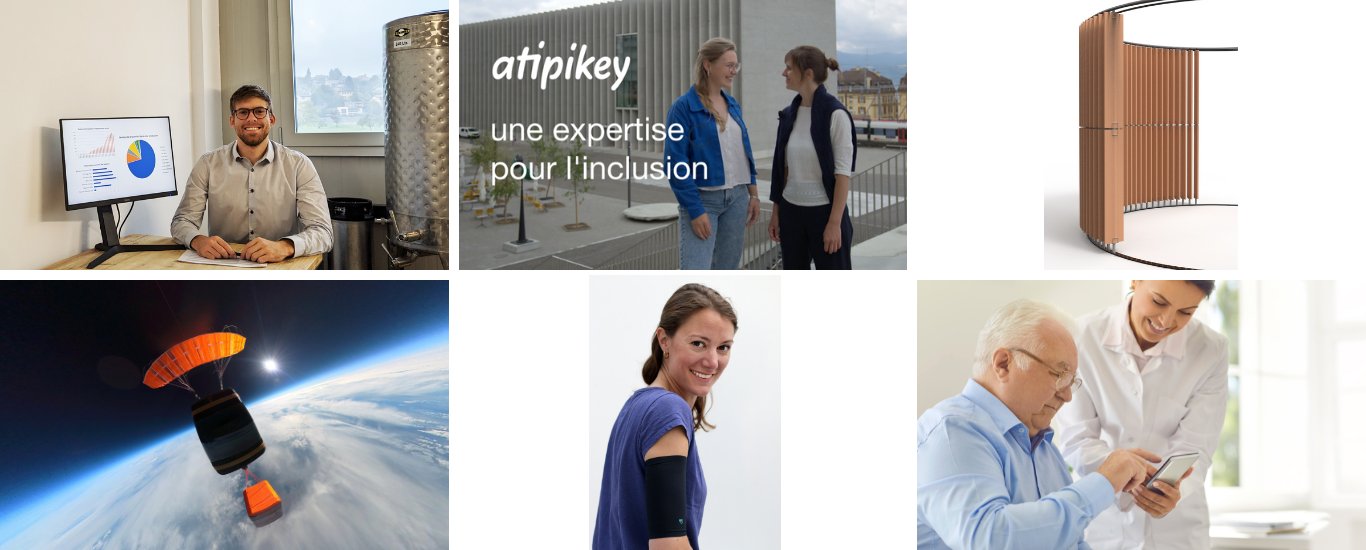
ATIPIKEY: facilitating the inclusion of neuro-atypical people
Companies wishing to develop a policy based on diversity and inclusion sometimes lack the resources to adapt their services and environment to the specific needs of atypical people. However, atypical talents can add a great value when the environment allows them to develop and perpetuate their potential. Improving accessibility helps to reduce company costs, as well as improving the efficiency and comfort of all employees and customer satisfaction.
Stemming from the UCreate programme at UNIL's Entrepreneurship and Innovation HUB, ATIPIKEY offers inclusion services by and for atypical people (in particular autistic people) in both public and private workplaces, in the form of a participatory process bringing together atypical talents and companies.
The two co-founders, Valentine Perrelet and Zoé Prisse, support companies that want to employ atypical profiles or make their products and services accessible by helping them to put in place conditions conducive to their inclusion. At the same time,
Impact Arti aims to reduce the environmental impact of beer production
The growing number of small breweries is a real problem in terms of environmental impact. Indeed, beer production generates a significant amount of CO2 over its entire life cycle, from the supply of raw materials through processing and distribution to consumption.
Impact Arti aims to provide brewers with a solution to reduce the environmental impact of the beer production cycle. Using his own brewery as an experimental laboratory, Loïc Scheidegger, a recently graduated industrial engineer from HEIG-VD, plans to use his research and solutions to develop a support methodology and help breweries in Switzerland to reduce their carbon emissions.
NaviSanté: simplifying access to the social and healthcare system
Resulting from the Défi Source challenge and supported by H4, NaviSanté aims to make the health and social services system more accessible to all, particularly the elderly, allophones, people with high social needs or low health literacy.
The three co-founders, Kevin Morisod, Dang Khoa Nguyen and Gwenola Eschenmoser, have designed the prototype of a digital platform based on artificial intelligence technologies called Large Language Models (LLM), to provide quick and accurate answers to questions about the socio-sanitary system in Vaud.
By communicating in the user's language (in text or voice recording), NaviSanté provides answers to questions about health insurance, practitioner qualifications and the availability of social services, as well as personal assistant capabilities to make it easier to book appointments, fill in forms, write emails, and make requests to the relevant parties.
Refreshing Unit, low-energy urban air conditioning
Backed by EPFL's Startup Launchpad, Malcolm Onifadé and his R.Unit project focus on the thermal comfort of pedestrians in urban environments during heat waves. In practice, R.Unit relies on an urban structure that takes advantage of rainwater to cool the ambient air in pedestrian zones, public spaces and transport hubs.
By optimizing water resource management, R.Unit reduces dependence on drinking water and alleviates urban water run-off problems. In addition, this approach encourages the industry to adopt environmentally-friendly practices, which could lead to an overhaul of standards, and ultimately create a transformative precedent for the entire heating, ventilation and air-conditioning sector.
R2Home minimizes the environmental impact of weather sensors and improves forecasts
Every year, more than 600,000 radiosondes are launched around the world, attached to weather balloons, to collect atmospheric data used for weather forecasting. But their return trajectory to the earth's surface is not controlled, so these single-use radiosondes have a huge environmental and economic impact.
Developed by Yohan Hadji from EPFL and Lucie Herter from Ecal, R2Home consists of an intelligent paragliding robot that guides the return of radiosondes to a precise landing point, enabling the same equipment to be reused. Currently being tested with the support of MeteoSwiss, the R2Home system has the potential to improve weather forecasting, facilitate research in atmospheric sciences, and thus contribute to our understanding of climate change.
thego.care: sleeves to protect catheters in patients' daily lives
PICC Lines are catheters used for a variety of medical purposes, such as chemotherapy, antibiotic therapy, parenteral nutrition or blood sampling. Worn in the upper arm, PICC Lines must remain in place for the duration of the treatment (up to one year), despite the fact that they are not allowed to get wet, and the considerable risk of snagging and dislodging them while dressing, sleeping or playing sport.
thego.care offers an everyday sleeve and shower cover to protect PICC Lines and all catheters in general. Certified as a medical device in Switzerland and Europe, the "Cathego" sleeve offers safe, everyday protection. The "Logo Proof" sleeve, meanwhile, offers watertight, easy-to-use protection for showering, and limits the risk of infection. Accompanied by H4, Alain Mundt has already convinced several hospitals with thego.care solutions, which make life easier for patients and the work of caregivers.
(Press release / ES)























































Please login or sign up to comment.
Commenting guidelines